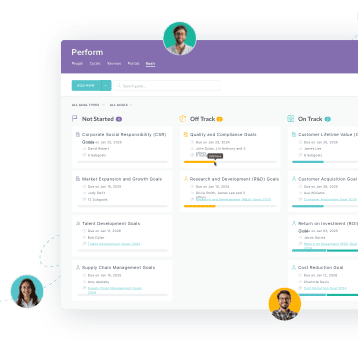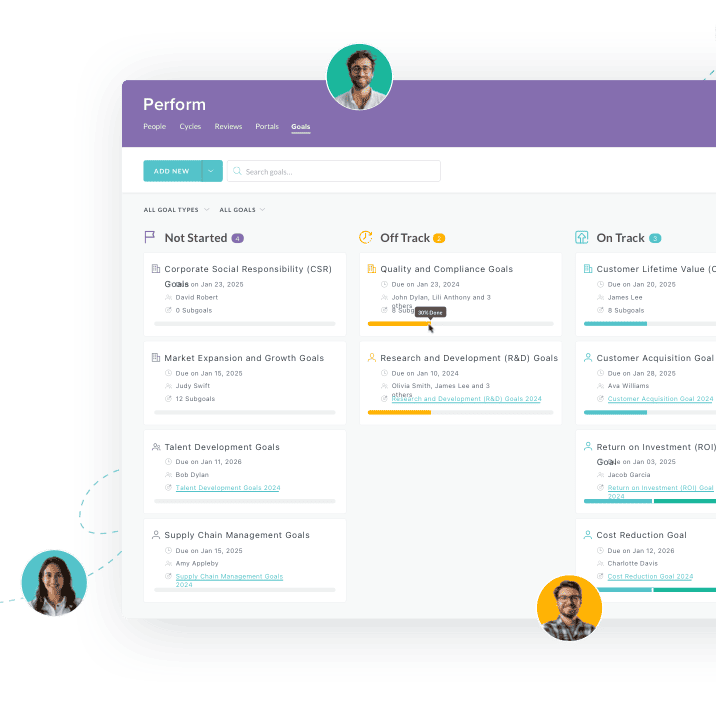7 Ways to Update Your Employee Performance Review Process



 Cut onboarding time
by 60%—here's the
Ultimate Checklist
that helped do it.
Cut onboarding time
by 60%—here's the
Ultimate Checklist
that helped do it.

How well is your current employee performance review process working?
More specifically, does your performance review system really give employees the information, feedback, and motivation they need to improve their performance? Or could it inadvertently be contributing to poor communication, low morale, and disengaged employees who are likely to leave your company? As organizations strive for continuous performance management, it's crucial to reassess and optimize your performance reviews and performance review software to ensure they're driving employee development and organizational performance.
What’s Wrong With Employee Performance Reviews Today?
Most experts now report that the concept of an annual performance review is an outdated idea that, at best, may not contribute to significant performance improvements, and at worst, may lead to more drastic outcomes—such as decreased employee retention.
In fact, there are seven common issues with employee performance reviews as we now conduct them:
1. Annual Performance Reviews Aren’t Frequent Enough
This is an outdated approach because employees need feedback and input on goals much more frequently.
When you really think about it, employees need monthly, weekly, and possibly even daily feedback on their performance. In fact, a recent study by OfficeVibe found that 96% of employees reported that they would like to receive employee feedback from their managers more regularly. This information gives them the valuable performance coaching they need to improve their performance and overall contributions. It also recognizes them for specific or ongoing contributions, fostering a feedback culture and employee recognition. Implementing weekly check-ins can significantly improve the timeliness and relevance of feedback.
2. One-Sided “Conversations”
Too often, a performance review turns into a lecture that is dominated by the manager, one that may even spend too much time focused on what the employee did wrong in the past year.
This type of approach misses out on the opportunity to have true performance conversations with each employee and foster the open communication needed to understand underlying issues or focus on what will really improve overall performance. Effective performance reviews should encourage two-way dialogue and constructive feedback, incorporating elements of 360 feedback and self-evaluation to provide a more comprehensive view of an employee's contributions.
3. Reviews That Don’t Focus on the Development of Skills
Just about everyone would agree that the goal of performance evaluations is to provide specific feedback that will help the employee continue to develop their skills—and their ability to contribute to the organization.
Yet so many performance reviews fall short for the simple reason that they don't do enough to support skill development and career development. Many managers fail to engage with employees by asking what they think they want or need, such as special training or professional development opportunities. Development conversations should be a key component of every performance review.
4. Lack of Alignment with Organizational Goals
Performance reviews often fail to connect individual performance goals with broader team performance and organizational objectives. This misalignment can lead to a disconnect between employee efforts and business outcomes. A robust performance management system should facilitate goal setting that cascades from organizational priorities to team goals and individual performance goals, ensuring that every employee understands how their work contributes to the company's success. Implementing cascading goals can help create this alignment.
5. Insufficient Focus on Future Performance
Traditional performance reviews tend to dwell on past performance without adequately addressing future expectations and growth opportunities. A more effective approach involves forward-looking performance conversations that discuss an employee's potential, career aspirations, and how they can contribute to high-performing teams. This future-oriented perspective can significantly boost employee engagement and motivation. Incorporating talent reviews into the process can help identify high-potential employees and support succession planning.
6. Inadequate Manager Training
Many managers lack proper training in writing performance reviews and conducting effective performance appraisals. This can result in inconsistent evaluations, biased assessments, and missed opportunities for meaningful feedback. Organizations should invest in comprehensive performance review training and performance appraisal training for managers, equipping them with the skills to provide constructive feedback, set clear expectations, and support employee development. This training should also cover important aspects like conflict resolution, using appropriate rating scales, and performance review calibration to ensure fairness and consistency across the organization.
7. Failure to Leverage Technology
In today's digital age, relying solely on annual paper-based reviews is inefficient and limits the potential for real-time feedback and continuous performance management. Implementing modern performance review software can streamline the process, facilitate ongoing check-ins, and provide valuable performance data to inform decision-making and identify trends. These tools can also support peer recognition programs and make it easier to conduct quarterly performance check-ins.
Tactical Issues With Employee Performance Reviews
There are other issues with most employee performance reviews, too. While some companies would consider these “minor,” they are actually representative of larger, more systemic issues and should also be addressed.
This includes process steps such as:
-
Methods to track progress, such as specific goal metrics or other KPIs.
-
Employee evaluation forms or paper-based methods to collect and process important performance information.
-
Checklists or other ways to make sure each review is as consistent (and as effective) as possible.
-
Lists of questions to make sure the conversation covers everything that is needed, instead of asking questions off the cuff or “winging” the entire review.
In this case, the little things add up quickly and point to the need for a better way to conduct employee evaluations and manage their overall performance throughout the year.


7 Ways to Improve Your Employee Performance Reviews
So how can your company overcome these challenges and implement a better employee performance review process? For starters, we recommend implementing powerful, proven performance management solutions that are a part of a larger suite of HR solutions.
This technology automates the entire appraisal process and offers other important functionality to set and track goals, monitor progress, engage employees with 360-degree reviews, and improve employee evaluations.
Here are seven ways you can improve your current approach to managing employee performance reviews.
1. Increase the Cadence of Check-Ins
As discussed earlier, managers should provide employees with feedback much more frequently than once a year. The entire company should encourage, or even require, more frequent employee performance reviews and empower managers with the best tools and skills possible to coach employees in real-time. This is the best way to recognize contributions, correct potential issues, and continue to give workers the ongoing feedback they crave.
2. Set Quarterly Performance Goals
Related to the point above, companies will always benefit from more frequent reviews, even down to quarterly reviews and check-ins. Millennials in particular love positive feedback, especially when it’s delivered at the moment they “earn” it. More check-ins give managers an opportunity to offer praise and other information to help them improve performance and develop professionally.
3. Provide True Coaching and Training, Not More Speeches
Managers should think of reviews as an opportunity to provide valuable coaching and training input (and resources), instead of more ways of managing and supervising employees. There’s a real opportunity to use employee performance reviews and ongoing feedback to help develop the employee, rather than just pointing out specific problems.
4. Implement Employee Self-Evaluation Programs
The company should also encourage employees to think about and assess their own performance. They should consider what areas they excelled in as well as the opportunities they have to improve. Managers can even ask if they have feedback for the company itself.
5. Provide Internal Growth Prospects and Get More Insides
Related to the point above, managers can simply ask employees for feedback about the company. It's important to recognize the talents within the current team when looking to fill senior roles.
This can be an effective way to get information that might not come out during a typical performance appraisal. Promoting existing employees not only acknowledges their hard work but also feels like the ultimate reward. By doing that, the managers can enrich regular reviews and provide a fuller picture that may not surface during standard performance assessments.
6. Take Advantage of Technology
Companies must move past manual, paper-based systems that contribute to too many errors and inefficiencies. Today, businesses can leverage the power of performance management software. This advanced technology streamlines and automates the entire process, offering a reliable solution to optimize performance evaluation and drive productivity.
7. Manage the Entire Employee Evaluation Cycle
Performance management software offers proven technology that automates and simplifies the entire process. These tools give ways to centralize feedback, take advantage of goal tracking, and even connect to employee engagement and rewards platforms to offer praise and kudos.
Consider a Better Approach to Employee Performance Management
If every challenge is truly an opportunity in disguise, most companies today are facing a real chance to improve their employee performance review process. Taking advantage of performance management solutions enables companies to truly engage employees, give them the tools needed to improve performance, and align their efforts with the company’s specific goals.
To learn more about HR Cloud and our innovative approach to employee performance management, please download our guide to “Performance Review Phrases You Should Use (and Some to Avoid)” today.
 Discover how our HR solutions streamline onboarding, boost employee engagement, and simplify HR management
Discover how our HR solutions streamline onboarding, boost employee engagement, and simplify HR management

Keep Reading
Why Healthcare Organizations Choose HR Cloud Over Alternatives
What is the Best Healthcare HR Software for Medical Organizations?
The Complete Guide to Remote Work Policy Compliance: Navigating Multi-State Tax, Legal, and Security Requirements in 2026
With 22.9% of US employees working remotely as of Q1 2024—up from 19.6% the previous year
Enterprise HRIS Implementation: Rippling vs HR Cloud Integration Capabilities and Deployment Success
Enterprise HR Software Implementation Comparison
Like What You Hear?
We'd love to chat with you more about how HR Cloud® can support your business's HR needs. Book Your Free Demo

Build a Culture of Recognition. Boost Engagement. Guaranteed.
Workmates empowers employees to stay informed, connected, and appreciated—whether they’re on the front line, in the office, or remote. Recognition drives 12x higher engagement.Trusted by industry leaders in every sector




Cut Onboarding Costs by 60%.
Take the confusion and follow-ups out of onboarding with automated workflows, digital forms, and structured portals—so new hires ramp faster 3X quicker.Trusted by industry leaders in every sector




